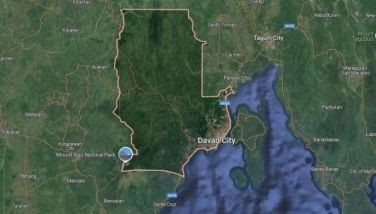A rather noisy place
November 18, 2001 | 12:00am
One cannot doubt it. There is far too much noise in this country. Horns, sirens, loudspeakers, mikes, megaphones and unnaturally thick vocal cords blast their ear-shattering messages all over. In many parts of the Philippines, music is no longer played, it is simply blared. In restaurants, malls, disco places, in perverted concert halls and – most disconcertingly of all – from your own neighbor’s karaoke room, a slew of deafening sounds purporting to be music – sounds alien to any configuration of harmony known to civilized society – heinously assault the senses, forcibly closing your eyes, gritting your teeth, unnerving your auditory nerves and reducing anything left to a fully catatonic state.
The political environment is equally merciless. Justices scream at each other and the Chief Justice of the Supreme Court – himself probably an advocate of judicial tranquillity – is soon projected by media as essaying a judicial gag in vain. The Ombudsman is of course a veritable screamer, loudly protesting his innocence and the sullying of his presumably erstwhile unsullied reputation.
In Congress’ Upper House, honorable senators stridently accuse other officials of dishonorable activities like graft, corruption and moral turpitude. In the Lower House, equally honorable congressmen – not to be outdone by their top-dwelling colleagues – garrulously talk of investigating allegedly nefarious activities of a gang of five, cavalierly ignoring the more specialized criminality of monads, dyads, triads and quads in the midst of officialdom.
The Executive generates its own sonic booms. Some Cabinet members, a few non-cabinet agency heads, many critical bureau chiefs and even an adjunct member of the official family transmogrify into media’s bomba headlines – those high decibel screamers that explosively allege lucrative interventions by some official in tempting megabusiness transactions or miraculously impressive bank accounts of some officials’ former comrades-in-arms. Military coups, police restiveness and similar noise give media editors a field day – perhaps also a nightmare – when they must choose one from among the many choice noisemakers for their next public offering.
Why is there so much shouting, why do so many people talk so much and so loud – at the same time – in this country? If almost everyone is screaming, are there enough left to listen, to quietly, soberly reflect on what is said and – minus the usual fanfare – to decisively act on the problems devastating this nation?
One can hazard guesses about why so much noise attends our national life. For a great many, it may be that the sense of abject helplessness drives them to try and direct themselves from the regular terrors of daily life – the poverty, the crime, the fecklesness and the treason of authorities who plunder their country instead of serving it well – and the ultimate terror of not being able to do anything about this gruesome situation. Noise distracts from a cruel reality and distraction is preferred and perhaps the only available defense for much of the public. Shouts, screams, high-intensity sounds keep a mind from thinking or reflecting seriously about anything; a mind that no longer seriously thinks blocks so much that is painful and mercifully permits precisely those without hope nevertheless to exist.
As for those few who have the power – those who are the influential and the well-appointed among our grossly disappointed people – the crucial function of noise remains to distract. Like Merlins working out their ill-destined Camelots, they would pull wool over the eyes of our people – fool all of them all of the time if this were possible – and find this magical feat to be greatly facilitated when they are able to first deafen the nation with voluminous rhetoric, mind-deadening oratory and at times discombobulating sounds of feigned alarm and self-serving strife.
Filipinos have to quiet down so that their rightful rage might be properly disciplined, controlled and driven to productive action by their own collective intelligence. Without quietly reflecting on their history as a nation, without tranquilly digesting all the clear lessons of their oligarchical history, Filipinos will find it hard to quietly organize themselves into a truly democratic force, a collective that will not be vulnerable to EDSA’s siren songs, whether it be EDSA One, or Two or Three. With the benefit of hindsight, one can now rightly say that EDSA’s songs are anything but democratic hymns. They have been mainly paeans to those who alternate in power. And as regards EDSA Tres, despite its visible trappings of poor people – enough hoi polloi presence and enough willfulness in their Labor Day march to Malacañang – its chant nevertheless had little democratic sense to guide it.
Democracy and cacophony do not mix well and the presence of one should not be mistaken for the existence of the other. Otherwise, the Philippines by this time would already have become the most impressively enduring democracy in the world. Those who would not romanticize the realities of this country as well as those who would not falsify its history to gain self-serving political advantages will attest to the incredible endurance of this country and its people. They will hesitate much in certifying to its being a democracy.
Quiet reflection builds up intelligent and effective public rage. Those who have oligarchically ruled this country are not much bothered by the high level of noise. They even contribute much to its more sonorous and strident forms. When quiet comes, the smartest among them will read its import properly. Seriously democratic Filipinos will not scream their lungs out before they have quietly organized their forces into becoming effective national liberators.
To date, this country has only had screamers.
The political environment is equally merciless. Justices scream at each other and the Chief Justice of the Supreme Court – himself probably an advocate of judicial tranquillity – is soon projected by media as essaying a judicial gag in vain. The Ombudsman is of course a veritable screamer, loudly protesting his innocence and the sullying of his presumably erstwhile unsullied reputation.
In Congress’ Upper House, honorable senators stridently accuse other officials of dishonorable activities like graft, corruption and moral turpitude. In the Lower House, equally honorable congressmen – not to be outdone by their top-dwelling colleagues – garrulously talk of investigating allegedly nefarious activities of a gang of five, cavalierly ignoring the more specialized criminality of monads, dyads, triads and quads in the midst of officialdom.
The Executive generates its own sonic booms. Some Cabinet members, a few non-cabinet agency heads, many critical bureau chiefs and even an adjunct member of the official family transmogrify into media’s bomba headlines – those high decibel screamers that explosively allege lucrative interventions by some official in tempting megabusiness transactions or miraculously impressive bank accounts of some officials’ former comrades-in-arms. Military coups, police restiveness and similar noise give media editors a field day – perhaps also a nightmare – when they must choose one from among the many choice noisemakers for their next public offering.
Why is there so much shouting, why do so many people talk so much and so loud – at the same time – in this country? If almost everyone is screaming, are there enough left to listen, to quietly, soberly reflect on what is said and – minus the usual fanfare – to decisively act on the problems devastating this nation?
One can hazard guesses about why so much noise attends our national life. For a great many, it may be that the sense of abject helplessness drives them to try and direct themselves from the regular terrors of daily life – the poverty, the crime, the fecklesness and the treason of authorities who plunder their country instead of serving it well – and the ultimate terror of not being able to do anything about this gruesome situation. Noise distracts from a cruel reality and distraction is preferred and perhaps the only available defense for much of the public. Shouts, screams, high-intensity sounds keep a mind from thinking or reflecting seriously about anything; a mind that no longer seriously thinks blocks so much that is painful and mercifully permits precisely those without hope nevertheless to exist.
As for those few who have the power – those who are the influential and the well-appointed among our grossly disappointed people – the crucial function of noise remains to distract. Like Merlins working out their ill-destined Camelots, they would pull wool over the eyes of our people – fool all of them all of the time if this were possible – and find this magical feat to be greatly facilitated when they are able to first deafen the nation with voluminous rhetoric, mind-deadening oratory and at times discombobulating sounds of feigned alarm and self-serving strife.
Filipinos have to quiet down so that their rightful rage might be properly disciplined, controlled and driven to productive action by their own collective intelligence. Without quietly reflecting on their history as a nation, without tranquilly digesting all the clear lessons of their oligarchical history, Filipinos will find it hard to quietly organize themselves into a truly democratic force, a collective that will not be vulnerable to EDSA’s siren songs, whether it be EDSA One, or Two or Three. With the benefit of hindsight, one can now rightly say that EDSA’s songs are anything but democratic hymns. They have been mainly paeans to those who alternate in power. And as regards EDSA Tres, despite its visible trappings of poor people – enough hoi polloi presence and enough willfulness in their Labor Day march to Malacañang – its chant nevertheless had little democratic sense to guide it.
Democracy and cacophony do not mix well and the presence of one should not be mistaken for the existence of the other. Otherwise, the Philippines by this time would already have become the most impressively enduring democracy in the world. Those who would not romanticize the realities of this country as well as those who would not falsify its history to gain self-serving political advantages will attest to the incredible endurance of this country and its people. They will hesitate much in certifying to its being a democracy.
Quiet reflection builds up intelligent and effective public rage. Those who have oligarchically ruled this country are not much bothered by the high level of noise. They even contribute much to its more sonorous and strident forms. When quiet comes, the smartest among them will read its import properly. Seriously democratic Filipinos will not scream their lungs out before they have quietly organized their forces into becoming effective national liberators.
To date, this country has only had screamers.
BrandSpace Articles
<
>
- Latest
- Trending
Trending
Latest
Trending
Latest
Recommended



























